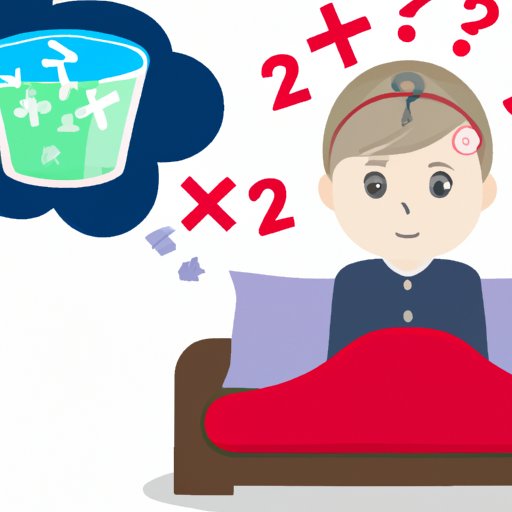I. Introduction
Waking up to dizziness can be an unpleasant way to start the day. It can leave you feeling disoriented, unbalanced, and even nauseous. While occasional morning dizziness is usually nothing to worry about, persistent and severe dizziness can be a sign of an underlying health problem.
In this article, we will explore the surprising reasons behind morning dizziness and offer practical solutions to help you minimize it and improve your overall health.
II. The Surprising Reasons Behind Your Morning Dizziness
Many people assume that morning dizziness is solely caused by a lack of sleep. However, there are several unexpected reasons that could be contributing to your morning dizziness. Some common reasons include:
- Medications or supplements that affect blood pressure
- Allergies or sinus problems
- Ear infections or inner ear problems
- Anxiety or stress
- Poor sleep quality

III. How Poor Sleep Quality Can Leave You Feeling Dizzy in the AM
The quality of your sleep can impact how you feel when you wake up in the morning. Lack of sleep or poor sleep quality can affect the body’s ability to regulate blood pressure and blood sugar levels, which can lead to feelings of dizziness upon waking. In addition, sleep apnea, a condition in which breathing stops and starts during sleep, can also cause morning dizziness.
To improve your sleep quality, establish a regular sleep routine, create a comfortable sleep environment, and avoid electronic devices before bedtime.
IV. Waking Up on the Wrong Side of the Bed: Dizziness Explained
Your sleep posture can also impact how you feel when you wake up in the morning. Sleeping in certain positions can restrict blood flow to the brain, leading to dizziness upon standing. To minimize morning dizziness caused by sleep posture, try sleeping on your back or elevating your head and upper body with a few pillows.
V. The Connection Between Dehydration and Morning Dizziness
Drinking enough water throughout the day is essential for overall health, but it’s especially important if you’re experiencing morning dizziness. Dehydration can cause low blood pressure, which can lead to feelings of dizziness and lightheadedness upon waking. To stay properly hydrated, aim to drink at least eight glasses of water per day and eat water-rich foods.
VI. Is Your Breakfast Making You Dizzy? Tips for Starting Your Day Right
What you eat for breakfast can also impact how you feel in the morning. Skipping breakfast or eating a meal with high amounts of sugar and refined carbohydrates can cause blood sugar fluctuations that lead to dizziness. To minimize morning dizziness caused by food, aim to eat a breakfast that is high in protein and complex carbohydrates. Some examples include eggs, smoothies, and oatmeal.
VII. When Dizziness is a Sign of Something More Serious: Seek Medical Advice
While occasional morning dizziness is usually nothing to worry about, persistent or severe dizziness can be a sign of an underlying health problem. If you are experiencing regular dizziness, it is important to seek medical advice. Some underlying causes of dizziness may include:
- Anemia
- Vertigo
- Migraines
- Low blood pressure
- Diabetes
- Heart problems
Don’t hesitate to talk to your healthcare provider if you’re concerned about your morning dizziness.
VIII. Practical Solutions to Minimise Morning Dizziness and Improve Your Overall Health
Here are some practical tips to help you minimize morning dizziness and improve your overall health:
- Establish a regular sleep routine and aim to get 7-8 hours of sleep per night
- Create a comfortable sleep environment that promotes relaxation and good sleep hygiene
- Stay hydrated throughout the day by drinking at least eight glasses of water and eating water-rich foods
- Eat a balanced breakfast that is high in protein and complex carbohydrates
- Avoid alcohol, caffeine, and tobacco, which can dehydrate and negatively impact sleep quality
- Practice stress-reduction techniques such as yoga, deep breathing, or meditation to help reduce anxiety and improve sleep quality
- Exercise regularly to help promote good sleep quality and overall health
IX. Conclusion
Waking up feeling dizzy can be a frustrating experience, but it doesn’t have to ruin your day. By understanding the surprising reasons behind morning dizziness and taking practical steps to minimize it, you can improve your overall health and wellbeing. Remember to talk to your healthcare provider if you’re concerned about your morning dizziness. With a little patience and persistence, you can start your day feeling balanced, energized, and ready to take on whatever comes your way.
